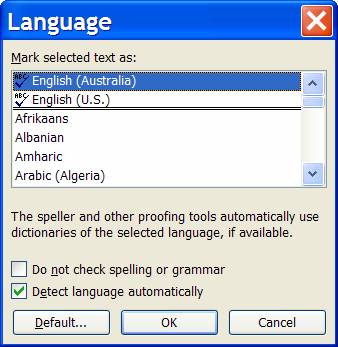Previous page
Task D: SentencesNext page
Topic 3: Referencing health essays and assignmentsIndex page
Workshops indexTask E: Editing and proofreading
Summary
Effective editing and proofreading can mean the difference between a pass and a distinction. After spending many hours on researching and writing your first draft, you owe it to yourself to edit (revise) your draft in order to improve it, and to proofread your draft for poorly constructed sentences, punctuation errors or spelling mistakes. Don't rely too heavily on the spelling checker on your computer to fix your mistakes, and BEWARE of the grammar checker.
You will learn:
- About editing
- How to proofread
- How to challenge your computer spell checker
- About the limitations of grammar checkers
Editing
The marker of your assignment/essay will be impressed if your writing is relevant, interesting, easy to read and thought-provoking. It is during the editing stage that you question whether you have achieved this. You might like to follow these steps to ensure effective editing:
- On completion of your first draft, take a break of a few hours or a few days to ensure you approach the editing with a fresh eye and mind.
- Print a hard copy of your draft and read it as if it belongs to someone else.
- Print an editing checklist and work through it systematically. Here are two checklists:
Proofreading
At the proofreading stage, the focus is more about the mechanics of writing: checking for grammar, sentence and spelling errors, and 'typos'. You may already have done some of this checking while working through the editing checklist; however, proofreading requires you to examine every sentence and every word. This Checklist of common errors (OWL, Purdue) can help you./p>
In addition, you should individualise your proofreading process. Review your past writings for tutors' comments to find out your typical problem areas, learn how to fix those areas, then check your writing for each type of error.
How to challenge your computer spell checker
The spell checker is an excellent tool to assist your writing; however, you need to understand its limitations:
- It will only pick up misspelled words. If you have typed the wrong word (e.g. contract instead of contact) spell checker will not identify the error.
- It won't detect missing words (e.g. The nurse's report had not completed. The word been is missing before completed.)
- It won't be able to help with words that sound the same (homophones) (e.g. patients/patience, who's/whose, principle/principal, their/there/they're, to/too/two, and other commonly confused words such as affect/effect, except/accept).
- Check that your spell checker is set to English (Australia). On your toolbar, click Tools; Language; Set Language, and check in the dialogue box that English (Australia) is highlighted.

(Microsoft Word 2003 for Windows)
Activity
Each of the sentences below contains an error that was missed by the spell checker. Read the following sentences, identify the error, write the correction on your scratch pad, then check your answer.
Exercise 1
One of the principle reasons for stress experienced during periods of hospitalisation is lack of communication.
Exercise 2
The majority of patients excepted the recommendations of their surgeons and did not request a second opinion.
Exercise 3
On entering hospital, patients leave the comfort and security on their homes for an unfamiliar setting.
Exercise 4
The issues faced by the nurse was whether the patients had understood what they had been told about their condition and treatment.
Exercise 5
A study was conducted of a group of patients who had under gone major surgery for carcinoma of the cervix or vulva; and most were found to be depressed.
Exercise 6
Patients admitted with an acute injury were often in shock and tended to either underestimate or overestimate their injuries severity.
Exercise 7
In order to gauge the most stressful time for patients, a hospital might consider monitoring the daily emotional reactions of some of it's patients using a mood adjective checklist or by interviewing the patients.
Exercise 8
Noise can be unpleasant, annoying or even distressing for some people, particularly when admitted a new environment such as a hospital.
More info
- Notorious confusables: A guide to avoiding word misuse and gaining knowledge spell-check doesn't have (CCC). (Click Index button and look for 'Notorious Confusables')
Limitations of grammar checkers
BEWARE of the grammar checker. Computer grammar checkers cannot pick up many of the common errors made in your writing. It is best to avoid using them. You need to know your grammar rules and apply them to your writing


